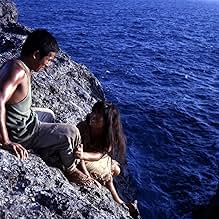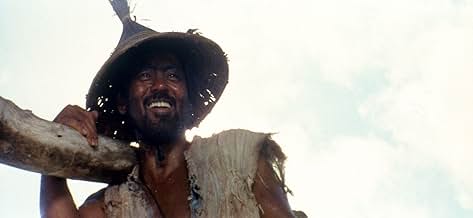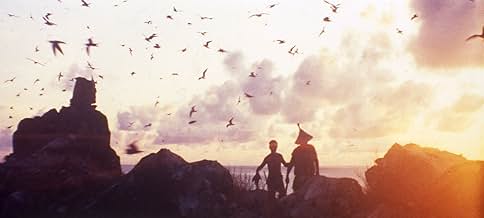CALIFICACIÓN DE IMDb
7.5/10
2.1 k
TU CALIFICACIÓN
Un ingeniero llega a una isla afectada por sequías con la intención de perforar un pozo para abastecer un molino de azúcar.Un ingeniero llega a una isla afectada por sequías con la intención de perforar un pozo para abastecer un molino de azúcar.Un ingeniero llega a una isla afectada por sequías con la intención de perforar un pozo para abastecer un molino de azúcar.
- Dirección
- Guionistas
- Elenco
- Premios
- 5 premios ganados y 1 nominación en total
- Dirección
- Guionistas
- Todo el elenco y el equipo
- Producción, taquilla y más en IMDbPro
Opiniones destacadas
Shôhei Imamura was already a well known name in Japanese cinema by 1968, having worked as an assistant to legendary film-maker Yasujirō Ozu and with a string of light-comedy, drama and documentary successes under his belt. 1968's Profound Desires of the Gods was to be his biggest undertaking yet, however the film's production was fraught with problems, running wildly over-budget and with the original shooting schedule of 6 months spiralling to 18 months by the films completion, a lot was riding on the success of the film, for both Imamura and production company Nikkatsu - unfortunately for both, the film was a huge failure at the box-office, too obscure and unconventional to gain the mainstream success it's production costs demanded. After it's failure Imamura retreated to documentary work for more than a decade, while Nikkatsu would not make such a lavish, high budget production again for many years. This huge failure probably goes some way to explain the film's lack of recognition on the international stage. For many years it was entirely unavailable to English speaking audiences, but thankfully that all changed last year with Eureka! entertainment's deluxe blu-ray release finally opening up Imamura's lost and misunderstood masterpiece to an international audience.
Profound Desires of the Gods is an engaging, provocative and bizarre piece that ostensibly explores on a number of different levels the duality of Japan's relationship with it's own culture and tradition versus the tide of modernisation and influence from the outside world. The story takes place on the fictional, but obviously Okinawa-inspired, southern Japanese island of Kurage and centres on the lives of the Futori family, who hold the claim to the oldest blood-line on the island. It is quickly made apparent that the Futori's are heavily inter- bred and are shunned and ostracised by the island's community, who refer to them as 'beastly' and believe that their incest is responsible for the islands misfortune. The family's patriarch, old and possibly-senile Yamamori, is both Father and Grandfather to Toriko, a dumb-witted girl whose childlike manner belies her almost feral desire for sex, while Toriko's Mother and Yamamori's Granddaughter Uma is a 'noro' or seer, who lives away from the family at the local shrine (the last remaining fresh water source on the island). Meanwhile, Uma's Son Kametaro is the most normal of the group and struggles to come to terms with his incestuous feelings for his sister Toriko and the islanders distaste for his family, while his Father and Yamamori's son Nekichi is imprisoned by his Father at the bottom of a flooded pit for his crimes against the community (dynamite fishing, and attempting an illicit incestuous relationship with their seer, his sister Uma) and given the near-impossible task of dislodging a huge boulder that has blocked the flow of water to the island's rice fields.
The rice fields point to a recurring parallel in the film, representing Japan's traditional agricultural past versus the modern uptake of sugar farming that the islanders turn to after the rice fields become untenable. Yamamori's desire to see the rice fields restored represents his families struggle to retain their ways in the face of the islanders scorn, while the incestuous relationship his family is born from and the parallel it poses to the islands' creation myth (where two sibling deities are married) represents the uneasy relationship some have with their superstitious past and their desire to see it forgotten from the islands culture. This is the central theme of the film, which in itself is a product of the mindset of Japan as a whole at the time the film was made, a Japan almost embarrassed by it's past and wanting to be perceived as modern thinking on the world stage. Although the Futori's incest marks them as outcasts and the negative results of such relationships are on display for all to see, Imamura effectively paints the family as sympathetic characters, symbolising traditions and religious and superstitious beliefs that fall in the face of modernisation, while casting a disapproving eye on the effects Western influence ultimately has on the island.
Profound Desires of the Gods is a complex and often bewildering film that moves at a disjointed, almost leisurely pace. Imamura has us firmly positioned entirely as voyeurs for much of the film, always watching events unfold at a distance, his characters enveloped by wide-angle shots of the beautiful Okinawan scenery that provides us with a cinematic feast for the eyes. His themes of east versus west and tradition versus progress are always present, yet never hammered home until the films climax, leaving the viewer to piece together the entangled web of the Futori's relationships and admire the films cinematography and the natural beauty of Okinawa. And in that regard, the film is a huge success, making up for what it lacks in pacing and narrative with sheer visual beauty and a deeper subtext that ultimately paints Kurage island and it's inhabitants as an allegory for what Imamura perceived as an increasing abandonment of Japanese culture and tradition to serve modern and Western needs. Surreal and thoughtful throughout, accompanied by beautiful and expertly shot visuals and with a message that's as pertinent today as it was then, Profound Desires of the Gods most certainly isn't a film for everyone, but it is in equal turns an epic and singular piece that surely must rank among Imamura's best.
Profound Desires of the Gods is an engaging, provocative and bizarre piece that ostensibly explores on a number of different levels the duality of Japan's relationship with it's own culture and tradition versus the tide of modernisation and influence from the outside world. The story takes place on the fictional, but obviously Okinawa-inspired, southern Japanese island of Kurage and centres on the lives of the Futori family, who hold the claim to the oldest blood-line on the island. It is quickly made apparent that the Futori's are heavily inter- bred and are shunned and ostracised by the island's community, who refer to them as 'beastly' and believe that their incest is responsible for the islands misfortune. The family's patriarch, old and possibly-senile Yamamori, is both Father and Grandfather to Toriko, a dumb-witted girl whose childlike manner belies her almost feral desire for sex, while Toriko's Mother and Yamamori's Granddaughter Uma is a 'noro' or seer, who lives away from the family at the local shrine (the last remaining fresh water source on the island). Meanwhile, Uma's Son Kametaro is the most normal of the group and struggles to come to terms with his incestuous feelings for his sister Toriko and the islanders distaste for his family, while his Father and Yamamori's son Nekichi is imprisoned by his Father at the bottom of a flooded pit for his crimes against the community (dynamite fishing, and attempting an illicit incestuous relationship with their seer, his sister Uma) and given the near-impossible task of dislodging a huge boulder that has blocked the flow of water to the island's rice fields.
The rice fields point to a recurring parallel in the film, representing Japan's traditional agricultural past versus the modern uptake of sugar farming that the islanders turn to after the rice fields become untenable. Yamamori's desire to see the rice fields restored represents his families struggle to retain their ways in the face of the islanders scorn, while the incestuous relationship his family is born from and the parallel it poses to the islands' creation myth (where two sibling deities are married) represents the uneasy relationship some have with their superstitious past and their desire to see it forgotten from the islands culture. This is the central theme of the film, which in itself is a product of the mindset of Japan as a whole at the time the film was made, a Japan almost embarrassed by it's past and wanting to be perceived as modern thinking on the world stage. Although the Futori's incest marks them as outcasts and the negative results of such relationships are on display for all to see, Imamura effectively paints the family as sympathetic characters, symbolising traditions and religious and superstitious beliefs that fall in the face of modernisation, while casting a disapproving eye on the effects Western influence ultimately has on the island.
Profound Desires of the Gods is a complex and often bewildering film that moves at a disjointed, almost leisurely pace. Imamura has us firmly positioned entirely as voyeurs for much of the film, always watching events unfold at a distance, his characters enveloped by wide-angle shots of the beautiful Okinawan scenery that provides us with a cinematic feast for the eyes. His themes of east versus west and tradition versus progress are always present, yet never hammered home until the films climax, leaving the viewer to piece together the entangled web of the Futori's relationships and admire the films cinematography and the natural beauty of Okinawa. And in that regard, the film is a huge success, making up for what it lacks in pacing and narrative with sheer visual beauty and a deeper subtext that ultimately paints Kurage island and it's inhabitants as an allegory for what Imamura perceived as an increasing abandonment of Japanese culture and tradition to serve modern and Western needs. Surreal and thoughtful throughout, accompanied by beautiful and expertly shot visuals and with a message that's as pertinent today as it was then, Profound Desires of the Gods most certainly isn't a film for everyone, but it is in equal turns an epic and singular piece that surely must rank among Imamura's best.
Profound Desires of the Gods, sometimes referred to as Imamura's overlooked epic, is an ambitious undertaking. Running at a daunting 173 minutes, it is ostensibly the tale of one inbred Ryukyu family's (the Futoris) attempts to regain lost social status. They do this by digging a pit to bury a huge boulder, and by seducing a mainland engineer with the feral, sexually-charged wild-child daughter. On another level, the film interrogates issues of modernity versus tradition, religious hypocrisy, and Japan's troubled relations with the outside world.
The film's successes are its luscious landscape, evocative production design of heathen and pagan rituals and artifacts, and portrayal of suppressed, taboo desires bursting to the fore. The narrative wanders and explores various tangents that can challenge the attention. This is filmmaking for cinema, and the gorgeous golden beaches and turquoise oceans had me longing to see this on the big screen. A murder by masked men at the end is also visually compelling. This film is interesting in bits, and flashes of genius occasionally show themselves, but the lack of coherence, repetition in the storyline, and outright dud moments (the heavenly vision of the departed patriarch), make this a problematic addition to the Imamura oeuvre. It hints at the great film that this project could have become, a realization of the potential of the vision, rather than the vision itself. Sometimes amazing, sometimes disappointing, this is one to watch and argue over.
The film's successes are its luscious landscape, evocative production design of heathen and pagan rituals and artifacts, and portrayal of suppressed, taboo desires bursting to the fore. The narrative wanders and explores various tangents that can challenge the attention. This is filmmaking for cinema, and the gorgeous golden beaches and turquoise oceans had me longing to see this on the big screen. A murder by masked men at the end is also visually compelling. This film is interesting in bits, and flashes of genius occasionally show themselves, but the lack of coherence, repetition in the storyline, and outright dud moments (the heavenly vision of the departed patriarch), make this a problematic addition to the Imamura oeuvre. It hints at the great film that this project could have become, a realization of the potential of the vision, rather than the vision itself. Sometimes amazing, sometimes disappointing, this is one to watch and argue over.
Trying to acknowledge the enigma of Japanese Cinema, outside the paddock of Akira Kurosawa (Seven Samurai) and Yasujiro Ozu (Tokyo Story), is a daunting yet arousing act. With Profound Desires of the Gods (1968), Shõhei Imamura redefined the rigorous notions of 'Japaneseness'. Because the Futori family retain the traditional belief that their island of Kurage was created through the sexual union of a brother god and sister goddess, the other more progressive islanders vilify them. When a Tokyo engineer arrives to supervise the creation of a new well, he unearths the mystifying extremism of the Noro (shaman). With Profound Desires, Imamura examines the dogma of Japanese mythology and investigates the disparaging effect of modernity and the ruinous consequence of Coca-Cola. It is a sizzling masterwork filled with Buñuelian surrealism, which deftly captures the alchemy of the natural world.
Of all the Imamuras I've seen, this is the one that goes to the desert island with me. "Profound Desires of the Gods" (1968) is a feverishly transportative and sumptuous film. It seems as if when one starts to think nothing happens, everything happens.
Imamura's view of humanity is a curious blend of pessimism and deep, resonant humor to the extent that they seem to cancel each other out. Perhaps this is why his films are so peculiarly observant, and indeed anthropological. In this respect he's successful both as a "realist" (a notion I'm not fond of in the domain of film but which I use here complimentarily) and a visual poet. In fact, some portions of this film strongly foreshadow Malick's "The Thin Red Line" (1998) in the visual depiction of the narrative role of nature.
All of the Imamuras I know have an image (motif) or a scene that become a kind of hub; definitions of the films and something that stay and live on in the memory. In this film there are many, but two images glow strongest: the pit that Nekichi and the Futoris have been digging for years, as well as the final climax at sea.
On the dedicated forum for this film it has been suggested that there are many parallels between this and Teshigahara's "Suna no onna" (1964). I think that's a connection worth acknowledging and at best it enriches both films.
At this writing this film has received only 475 votes, which is a very small number considering this film has been available on Blu-ray courtesy of the Masters of Cinema series (Region B) for two and a half years.
Imamura's view of humanity is a curious blend of pessimism and deep, resonant humor to the extent that they seem to cancel each other out. Perhaps this is why his films are so peculiarly observant, and indeed anthropological. In this respect he's successful both as a "realist" (a notion I'm not fond of in the domain of film but which I use here complimentarily) and a visual poet. In fact, some portions of this film strongly foreshadow Malick's "The Thin Red Line" (1998) in the visual depiction of the narrative role of nature.
All of the Imamuras I know have an image (motif) or a scene that become a kind of hub; definitions of the films and something that stay and live on in the memory. In this film there are many, but two images glow strongest: the pit that Nekichi and the Futoris have been digging for years, as well as the final climax at sea.
On the dedicated forum for this film it has been suggested that there are many parallels between this and Teshigahara's "Suna no onna" (1964). I think that's a connection worth acknowledging and at best it enriches both films.
At this writing this film has received only 475 votes, which is a very small number considering this film has been available on Blu-ray courtesy of the Masters of Cinema series (Region B) for two and a half years.
A very candid and often uncomfortable examination of traditional cultures and their survival into modernity.
This movie has a rich and distinctive rhythm, immersing itself in the natural world. Sometimes sort of funny in a messed up way, it also has a very dark core.
I especially liked the humdrum little clerk finding a new part of himself in his relationship with the mentally disabled girl. I don't know if it's an insensitive portrayal but it adds to the movie's rawness.
I've never seen a movie quite like it even if I ultimately watched it in two sittings.
This movie has a rich and distinctive rhythm, immersing itself in the natural world. Sometimes sort of funny in a messed up way, it also has a very dark core.
I especially liked the humdrum little clerk finding a new part of himself in his relationship with the mentally disabled girl. I don't know if it's an insensitive portrayal but it adds to the movie's rawness.
I've never seen a movie quite like it even if I ultimately watched it in two sittings.
¿Sabías que…?
- TriviaOfficial submission of Japan for the 'Best Foreign Language Film' category of the 42nd Academy Awards in 1970.
- Citas
Yamamori Futor: He shouldn't take money. The engineer is a god who came from beyond the sea. It will not do to take money for serving that god.
- ConexionesFeatured in Cinéma, de notre temps: Shohei Imamura, le libre penseur (1995)
Selecciones populares
Inicia sesión para calificar y agrega a la lista de videos para obtener recomendaciones personalizadas
- How long is Profound Desires of the Gods?Con tecnología de Alexa
Detalles
- Fecha de lanzamiento
- País de origen
- Idioma
- También se conoce como
- Profound Desires of the Gods
- Locaciones de filmación
- Ishigaki-jima, Ryukyu Islands, Japón(Spelling error)
- Productora
- Ver más créditos de la compañía en IMDbPro
Contribuir a esta página
Sugiere una edición o agrega el contenido que falta

Principales brechas de datos
By what name was El deseo profundo de los dioses (1968) officially released in Canada in English?
Responda











